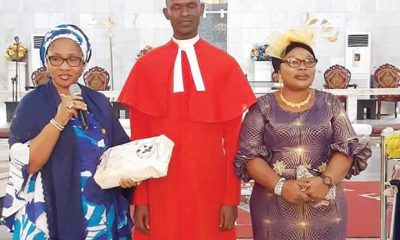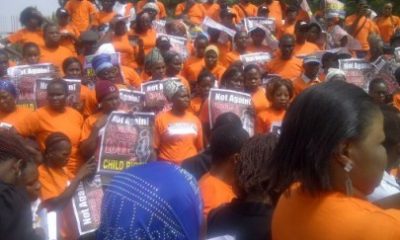crime
Former INEC Chief Re-Arraigned For Accepting Gratification From Diezani

 The Economic and Financial Crimes Commission (EFCC) on Wednesday re-arraigned a former Independent National Electoral Commission (INEC) Administrative Secretary, Mr Christian Nwosu for allegedly accepting gratification from former Minister of Petroleum, Diezani Alison-Madueke.
The Economic and Financial Crimes Commission (EFCC) on Wednesday re-arraigned a former Independent National Electoral Commission (INEC) Administrative Secretary, Mr Christian Nwosu for allegedly accepting gratification from former Minister of Petroleum, Diezani Alison-Madueke.
He was arraigned with Tijani Bashir, as well as Alison-Madueke (still at large) and Yisa Adedoyin, who was earlier convicted when he pleaded guilty.
Nwosu had earlier pleaded guilty to receiving N30 million bribe from Alison-Madueke to rig the 2015 general election, but later changed her plea from guilty to not guilty.
They were alleged to have conspired together to directly take possession of N264,880,000 which they reasonably ought to have known formed part of an unlawful act, which is gratification.
They were also alleged to have made cash payment of N70,050,000 to Yisa Adedoyin, which exceeded the amount authorised by law without going through a financial institution.
Bashir was accused of indirectly taking possession of and retaining N164,880,000 which he reasonably ought to have known forms part of gratification.
Bashir was also charged with indirectly retaining N30 million, being part of the proceeds of an unlawful act: criminal misappropriation as he indirectly concealed the N30 million.
The alleged offences were committed between March 27 and April 7, 2015.
EFCC had closed its case after calling all its witnesses.
Prosecuting counsel, Rotimi Oyedepo said he would not call any further witness despite the amended charge.
Before the re-arraignment, Nwosu’s lawyer, Chief Nelson Imoh had opposed the move on the basis that it would further delay the case.
He said the prosecution did not respond to his no-case client’s submission despite being served.
He argued that the amendment would defeat the object of the Administration of Criminal Justice Act (ACJA) 2015 which provides for speedy dispensation of cases.
But, Oyedepo argued that the law allowed the prosecution to amend a charge at any time before judgment is delivered.
Ruling, Justice Mohammed Idris held that EFCC was at liberty to amend its charge at any time before judgement.
“The law says ‘anytime before judgment’. It does not specify the time. I accept the amended charge,” the judge ruled.
After the re-arraignment, he allowed the defendants to remain on bail earlier granted them.
The judge thereafter adjourned until March 29 for adoption of written addresses in the no-case submission of the accused persons.
-

 news7 years ago
news7 years agoOsun Government presents 2015, 2016 audited accounts…sets record as the first state in Nigeria to publicly declare accounts
-

 crime5 years ago
crime5 years agoArotile’s ex-classmate had no driver’s licence, report reveals
-

 lifestyle8 years ago
lifestyle8 years agoAmazing Tips for an Outstanding Makeup
-

 news4 years ago
news4 years ago2023: Kola Abiola Set To Declare For Presidency
-

 entertainment5 years ago
entertainment5 years agosanwo-Olu honours sacked chaplain after Ambode’s wife saga
-

 entertainment6 years ago
entertainment6 years agoSee how Women now use toothpaste to tighten vagina
-

 business5 years ago
business5 years ago#EndSARS: Access Bank announces N50 billion interest-free facility for businesses
-

 lifestyle5 years ago
lifestyle5 years agoUS Church ‘refunds members three years tithes’ as help during COVID-19

